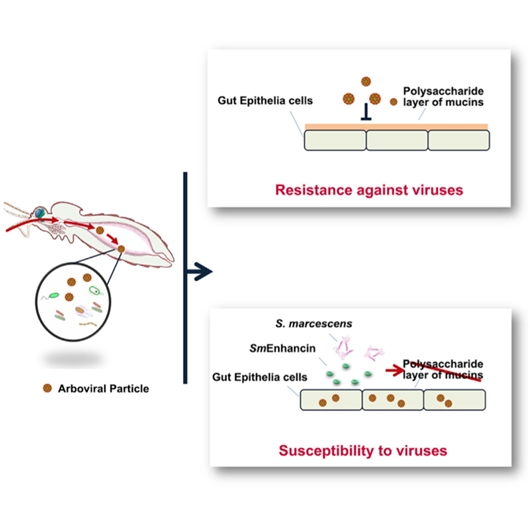Studies have found that regulation of intestinal bacteria can affect the ability of mosquito-borne viruses to spread January 2, 2019 Source: Web of Science Author: Ren Fang Yan Recently, Cheng Gong, a researcher at Tsinghua University Medical College, found that it can regulate the mosquito commensal bacterium, Serratia marcescens, and thus affect the ability of mosquitoes to spread viruses. The results of the study were published in Cell Hosts and Microorganisms. Blood-feeding mosquitoes can carry and spread hundreds of potent human viruses. The virus enters the mosquitoes through the host's blood and infects the epithelial cells of the mosquito's intestines, which in turn spread to the salivary glands of the mosquitoes. "There are more than 3,500 different mosquitoes in the world, but less than 100 species of pathogens can be carried and transmitted. There is a strict correspondence between mosquito-borne viruses and mosquitoes, so different mosquitoes have different susceptibility to viruses." Tell the reporter of the Chinese Journal of Science. The intestinal tissue is the first organ in contact with the virus in the mosquito, and there are many factors that affect the virus infection, which plays a decisive role in the susceptibility of the mosquito virus. By assessing the effects of different intestinal strains, the researchers found that Serratia marcescens significantly enhanced the susceptibility of Aedes mosquitoes to mosquito-borne viruses. In addition, the content of this bacteria is also related to the prevalence of dengue virus. The researchers fed S. serrata to Aedes aegypti in low-risk areas of dengue virus and found that Aedes mosquitoes are easy to dengue virus. Sensual enhancement. The study further clarified the mechanism of action of Serratia marcescens in assisting dengue virus infection in Aedes. The researchers found that SmEnhancin, a protein secreted by Serratia marcescens, is a key effector molecule in the process of viral infection. This protein can degrade the mucin layer on the surface of mosquito intestinal cells, thereby improving the susceptibility of intestinal cells to viruses. This study was the first to discover the role of intestinal bacterial-encoded protein factors in the recruitment of mosquito-borne viruses, revealing the interrelationship between intestinal commensal bacteria, mosquitoes, and mosquito-borne viruses. The bacterial factor SmEnhancin secreted by the intestinal commensal Serratia marcescens can increase the susceptibility of mosquitoes to certain viruses. (Source: Cell Host & Microbe) Residential Flood Barrier,Flood Barrier For House,Flood Barrier Residential,Flood Barrier Around House Denilco Environmental technology(Suzhou)Co., Ltd. , https://www.wflood.com